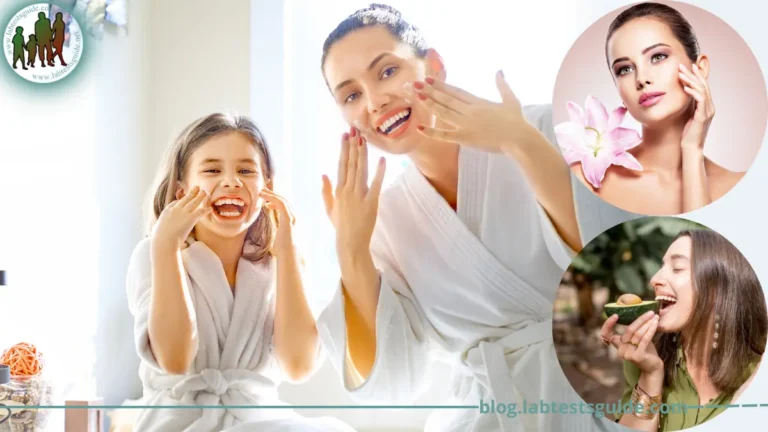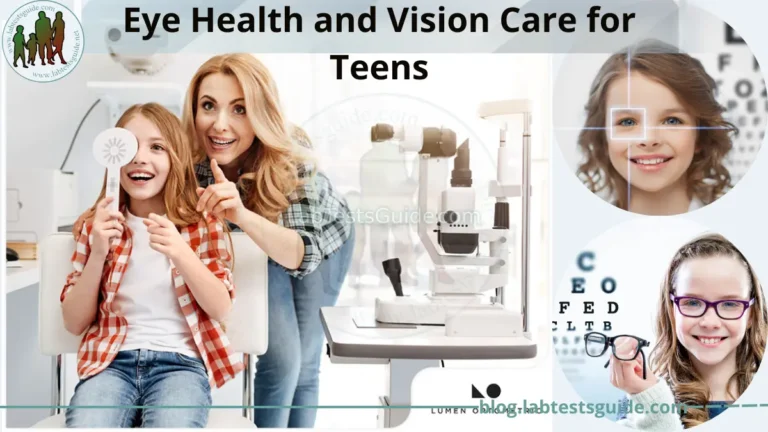Acne and Skin Care Tips: Acne is a common skin condition that affects many teenagers. It occurs when the skin pores become clogged with oil, dead skin cells, and bacteria, leading to the development of pimples, blackheads, and whiteheads. Acne can have a negative impact on a teen’s self-esteem and confidence, so it’s important to learn effective skin care strategies to control and prevent acne breakouts. In this article, we’ll discuss the causes of teen acne, provide tips for effective skin care, and review some treatment options for teens with acne.

Causes of acne in teens:
Acne is mainly caused by the overproduction of sebum, an oily substance that helps keep the skin lubricated. In adolescents, acne is often caused by hormonal changes that occur during puberty. During this time, the body produces higher levels of androgens, which can cause the sebaceous glands to produce more oil, leading to the development of acne.
In addition to hormonal changes, genetics may also play a role in the development of adolescent acne. If a teen’s parents or siblings have a history of acne, they are more likely to develop acne themselves.
Poor skin hygiene is another factor that can contribute to the development of acne. Not cleansing your skin regularly or using harsh or irritating skin care products can exacerbate existing acne and cause new breakouts. Additionally, touching or picking at the skin can transfer bacteria and oils into the pores, leading to the development of new blackheads.
In general, the causes of acne in adolescents are multifactorial and often it is a combination of genetic, hormonal and environmental factors that lead to the development of acne.
Why acne is common in teenagers:
Acne is particularly common in adolescents because this is a time when the body undergoes significant hormonal changes. During puberty, the body produces higher levels of androgens, such as testosterone, which stimulate the sebaceous glands to produce more oil. This excess oil production can clog pores and lead to acne development.
Also, during adolescence, the skin goes through a natural process of shedding and renewal, which can also contribute to the development of acne. Dead skin cells can accumulate in pores, mixing with excess oil and bacteria to form blackheads, whiteheads, and other types of acne lesions.
Teenagers are also more likely to engage in certain behaviors that can exacerbate acne. For example, they may use harsh or irritating skin care products, touch their face frequently, or not cleanse their skin regularly.
In general, the combination of hormonal changes, flaking skin, and environmental factors can make acne particularly common in adolescents. However, with the right skin care strategies and treatments, most cases of acne can be effectively managed and treated.
Skin care tips for teens with acne:
Daily cleansing routine:
Here are some tips for an effective cleaning routine:
- Wash your face twice a day: Cleansing your face twice a day, in the morning and before bed, can help remove excess oil, dead skin cells, and other impurities that can clog pores and contribute to blemishes. acne.
- Use a gentle cleanser: Look for a gentle, non-comedogenic cleanser formulated specifically for acne-prone skin. Avoid harsh or abrasive scrubs, which can irritate the skin and exacerbate acne.
- Use lukewarm water: Hot water can strip skin of its natural oils, while cold water may not effectively remove impurities. Use lukewarm water to clean your face.
- Use your hands or a soft cloth: Avoid using rough cloths or other harsh materials to clean your face, as this can irritate the skin. Instead, use your hands or a soft cloth to gently clean the skin.
- Rinse well: Be sure to rinse your face thoroughly with lukewarm water to remove all traces of cleanser and impurities.
- Dry: After cleansing, use a clean towel to dry your face. Avoid rubbing or rubbing the skin, which can cause irritation.
- Follow up with a moisturizer: Applying a non-comedogenic moisturizer can help keep skin hydrated without clogging pores.
By following these tips, you can establish an effective daily cleansing routine to help control and prevent acne breakouts.
Choosing the right skincare products:
Here are some tips to help you choose the best products for your skin:
- Look for products labeled “non-comedogenic”: Non-comedogenic products are formulated to prevent pore clogging, which can help prevent acne breakouts.
- Choose products with salicylic acid or benzoyl peroxide: These ingredients are commonly used in acne-fighting skincare products and can help unclog pores and reduce inflammation.
- Avoid products with alcohol: Products that contain high levels of alcohol can strip the skin of its natural oils, leading to dryness and irritation.
- Test new products before using: To avoid potential allergic reactions or irritation, it’s a good idea to test new products on a small area of skin before using on the entire face.
- Use sunscreen: Sun exposure can exacerbate acne and cause dark spots or scarring. Choose a non-comedogenic sunscreen with at least SPF 30 and apply it daily.
- See a dermatologist: If you’re having a hard time finding the right skin care products for your acne-prone skin, consider seeing a dermatologist. They can recommend products and treatments tailored to your specific skin type and acne severity.
In general, choosing the right skin care products can help control and prevent acne breakouts. By selecting non-comedogenic products and avoiding ingredients that can irritate the skin, you can keep your skin healthy and clear.
Avoiding certain foods and habits:
Here are some tips to avoid foods and habits that can contribute to acne breakouts:
- Limit dairy intake: Some studies suggest that dairy products, particularly those containing high levels of hormones, may worsen acne in some people. Consider limiting your intake of milk, cheese, and other dairy products to see if it has a positive effect on your skin.
- Avoid foods with a high glycemic index: Foods with a high glycemic index, such as white bread, pasta, and sugary snacks, can cause spikes in blood sugar levels, which can contribute to the development of acne.
- Don’t touch your face: Frequent touching of your face can transfer bacteria and oil to your skin, leading to the development of acne. Avoid touching your face unless necessary and always wash your hands before touching your face.
- Avoid touching your skin: Touching acne lesions can worsen inflammation and increase the risk of scarring. Avoid touching your skin and consider using a spot treatment to help reduce inflammation.
- Manage stress: Stress can trigger hormonal changes that can exacerbate acne breakouts. Consider incorporating stress-reducing activities, such as meditation or yoga, into your daily routine.
By avoiding certain foods and habits, you can help control existing acne and prevent future breakouts. While it may take some trial and error to determine what works best for your skin, maintaining a healthy lifestyle and practicing good skin care habits can go a long way in keeping your skin clear and healthy.
Over-the-counter acne medications:
Here are some common types of over-the-counter acne medications:
- Benzoyl Peroxide: Benzoyl peroxide is a topical medication that works by killing bacteria on the skin and reducing inflammation. It is available in a variety of concentrations, from 2.5% to 10%, and can be found in various forms, such as creams, gels, and washes.
- Salicylic Acid: Salicylic acid is a beta-hydroxy acid that works by exfoliating the skin and unclogging pores. It is available in a variety of concentrations, from 0.5% to 2%, and can be found in various forms, such as creams, gels, and washes.
- Alpha-Hydroxy Acids (AHAs): AHAs, such as glycolic acid and lactic acid, work by exfoliating the skin and reducing the appearance of acne scars. They are available in various concentrations and can be found in toners, serums, and creams.
- Sulfur: Sulfur is an anti-inflammatory agent that works by reducing inflammation and killing bacteria on the skin. It is available in various forms such as creams, lotions, and masks.
- Retinoids: Retinoids, such as adapalene, are a type of vitamin A derivative that work by unclogging pores and reducing inflammation. They are available in various concentrations and can be found in creams, gels, and serums.
It’s important to note that not all over-the-counter acne medications are suitable for all skin types. Some medications may be too strong for sensitive skin, while others may cause dryness or irritation. If you have sensitive skin or aren’t sure which medications to use, consider seeing a dermatologist for advice.
When using over-the-counter acne medications, it’s important to follow instructions carefully and be patient. It can take several weeks or even months to see noticeable results, and overuse of these medications can cause dryness and irritation. If you experience any adverse reaction or worsening of your acne, discontinue use and consult a dermatologist.
Home remedies for Acne and Skin Care:
Here are some home remedies you may want to try:
- Tea Tree Oil: Tea tree oil is a natural anti-inflammatory and antibacterial agent that can help reduce inflammation and kill bacteria on the skin. To use, dilute tea tree oil with a carrier oil, such as jojoba or coconut oil, and apply to affected areas.
- Aloe vera : Aloe vera has anti-inflammatory and antibacterial properties and can help soothe and heal acne-prone skin. Apply aloe vera gel directly to the affected areas.
- Green Tea : Green tea is rich in antioxidants and has anti-inflammatory properties that can help reduce inflammation and redness associated with acne. Prepare a cup of green tea, allow it to cool, and use a cotton ball to apply the tea to your skin.
- Honey: Honey has antibacterial properties and can help reduce inflammation and redness associated with acne. Apply raw organic honey directly to the affected areas and leave it on for 10-15 minutes before rinsing it off.
- Apple Cider Vinegar: Apple cider vinegar has antibacterial properties and can help balance the skin’s pH, reducing the risk of acne. Dilute apple cider vinegar with water and apply to the affected areas using a cotton ball.
It’s important to note that home remedies may not work for everyone, and some may be too harsh for certain skin types. If you have sensitive skin or aren’t sure which remedies to try, consider seeing a dermatologist for advice. Also, while home remedies can be a helpful addition to your skin care routine, they should not replace medical treatment for severe or persistent acne.
lifestyle changes for Acne and Skin Care:
Here are some lifestyle changes you may want to consider:
- Manage stress: Stress can trigger acne breakouts by increasing the production of hormones that stimulate oil production in the skin. Try to find healthy ways to manage stress, such as exercising, meditating, or spending time with loved ones.
- Get enough sleep: Lack of sleep can increase inflammation in the body, which can lead to acne breakouts. Try to get 7-9 hours of sleep a night to help keep your skin healthy.
- Exercise regularly: Exercise can help reduce stress, improve circulation, and promote healthy skin. Try to get at least 30 minutes of moderate exercise each day.
- Eat a healthy diet: A healthy diet that is rich in whole foods, fruits, and vegetables can help promote healthy skin. Avoid processed foods, sugary drinks, and excessive dairy consumption, which can trigger acne breakouts in some people.
- Avoid touching your skin: Touching your acne can spread bacteria and cause scarring. Resist the temptation to touch your skin and instead focus on treating it with gentle and effective skin care products.
By incorporating these lifestyle changes into your daily routine, you can help reduce acne breakouts and promote healthy, glowing skin.
When to seek professional help:
Here are some signs that it may be time to seek professional help:
- Your acne is severe: If you have deep, painful cysts or nodules, or if your acne is widespread and affects a large area of your face or body, it may be time to see a dermatologist.
- Over-the-counter treatments don’t work: If you’ve tried over-the-counter acne treatments for several weeks or months with no improvement, it may be time to see a dermatologist.
- Your acne is leaving scars : If your acne is leaving scars or dark spots on your skin, it is important to seek professional help to prevent further scarring.
- You have other symptoms: If you have other symptoms, such as fever or joint pain, in addition to acne, it may be a sign of a more serious underlying condition.
- Your self-esteem is affected: If your acne is affecting your self-esteem or causing you emotional distress, it is important to seek professional help to address the physical and emotional aspects of your acne.
A dermatologist can help diagnose the cause of your acne and recommend the most effective treatment options for your individual needs. They can also provide guidance on skin care products and lifestyle changes to help improve the health of your skin.
Conclusion:
but there are steps you can take to control it and improve the health of your skin. By establishing a daily cleansing routine, choosing the right skin care products, avoiding certain foods and habits, and incorporating lifestyle changes like managing stress and getting enough sleep, you can help reduce acne breakouts. and promote healthy, glowing skin. Additionally, over-the-counter medications and home remedies can be helpful for mild to moderate acne, but it’s important to seek professional help if your acne is severe or persistent. Remember, everyone’s skin is unique, so it may take some trial and error to find the right combination of treatments that works for you. With patience and persistence, you can achieve clearer, healthier looking skin.






